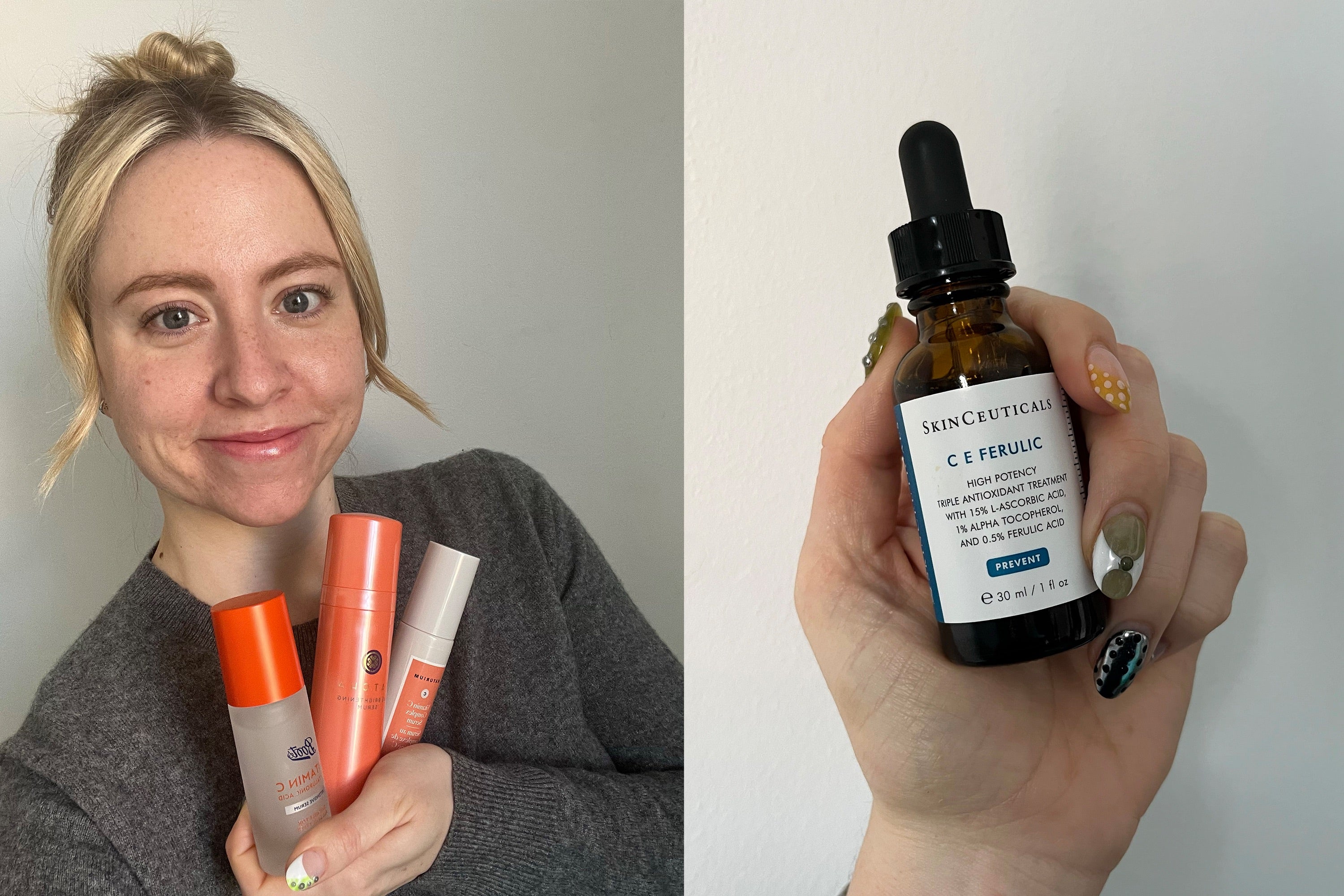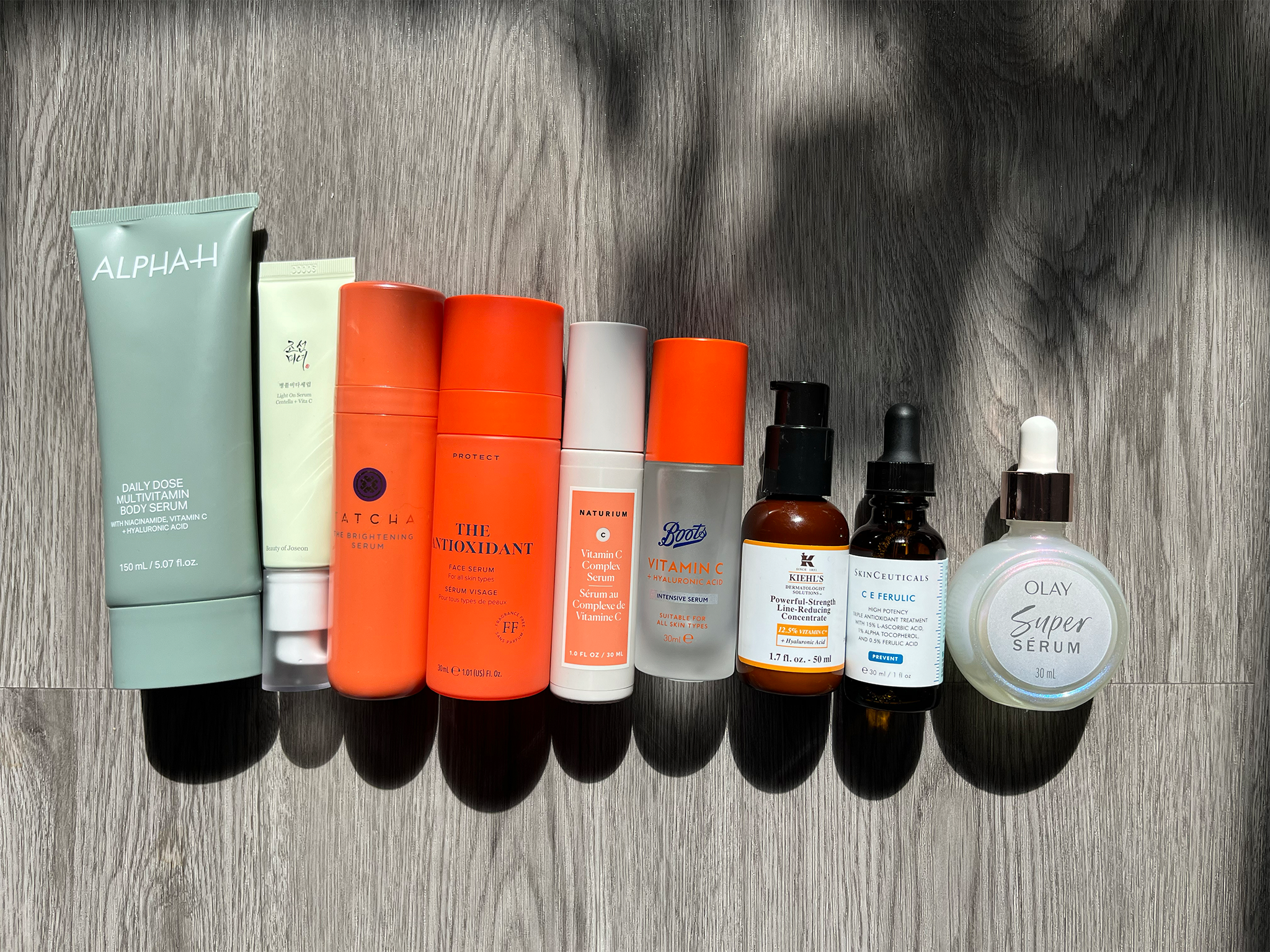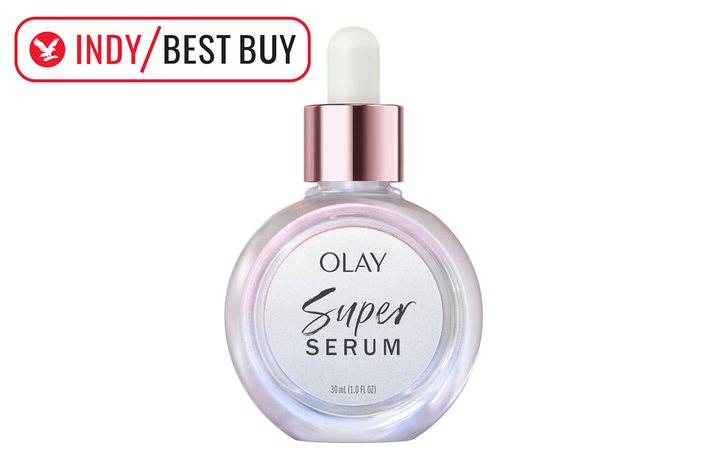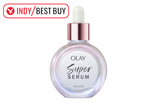The Independent's journalism is supported by our readers. When you purchase through links on our site, we may earn commission. Why trust us?
8 best vitamin C serums, tested by a beauty editor
Brighten your skin and soothe redness with elixirs from Olay, Kiehl’s and Boots

It can seem like every actor, model and red-carpet regular has bright, even and luminous skin. While genetics and great facials help, one ingredient sits at the centre of many a glow-boostingroutine: vitamin C. If you’ve yet to add this heroingredient to your own skincare lineup, I’ve rounded up my pick of the best vitamin C serums for every skin type.
As a beauty editor who’s prone to hormonal acne and rosacea, I’m well aware that vitamin C serums can be hit or miss for sensitive skin types. So I set about testing a range of vitamin C serums to find formulas that deliver results without irritation. You don’t need to spend a fortune, either.
Harley Street dermatologist Dr Ariel Haus explains that vitamin C is “a powerful antioxidant that helps protect the skin from free radical damage caused by UV exposure and pollution”. He adds that it supports collagen production and helps improve dullness and pigmentation.
He advises that vitamin C should be used in the morning and paired with SPF. “Daily sunscreen application is an essential step to protecting our skin, because UV rays are a major contributor to premature ageing, hyperpigmentation, and skin cancer”, says Dr Haus.
With all that in mind, keep scrolling for my pick of the best vitamin C serums that will help you put your best face forward.
Read more: Best anti-ageing serums that target wrinkles, dark spots and dullness
The best vitamin C serums for 2026 are:
- Best overall – Olay super serum: £39.99, Boots.com
- Best budget buy – Beauty Of Joseon light on serum with centella + vita C: £17.99, Superdrug.com
- Best for all skin types – Skin Rocks the antioxidant: £70, Spacenk.com
- Best luxury serum – Tatcha the brightening serum: £86, Sephora.co.uk
How I tested

For two months, I introduced a selection of vitamin C serums into my morning routine, following each serum with my normal moisturiser, SPF, or both, to see how each serum held up within different skincare routines. I paid attention to everything from value for money to how noticeable the results of each formula were. You’ll find a more detailed list of my testing criteria at the end of this article.
Read more: Best eye creams for tired eyes, tried and tested by a beauty editor
1Olay super serum

- Best Vitamin C serum overall
- Size 30ml
- Key ingredients Vitamin C, niacinimide, collagen peptides, lactic acid
- Why we love it
- Addresses multiple skin concerns
- Often on sale
- Take note
- Heavily fragranced which may irritate skin that’s sensitive
This is a multipurpose serum with a powerful mix of ingredients. The vitamin C brightens your skin while niacinamide improves discolouration. Collagen peptides reduce fine lines, and lactic acid provides a mild exfoliation and hydration boost. The biggest difference I saw was an improvement in texture after each application of this fast-absorbing milky formula. My complexion was immediately smoother.

It doesn’t take any effort to rub in, has a handy pipette dispenser which makes it easy to distribute onto your hands and face, and it didn’t irritate my sensitive, acne-prone skin. This is an easy introduction to vitamin C if you’re new to the often volatile ingredient.
2Beauty Of Joseon light on serum with centella + vita C

- Best Budget vitamin C serum
- Size 30ml
- Key ingredients Vitamin C, centella asiatica, ethyl ascorbic acid
- Why we love it
- Compact packaging
- Lightweight gel texture
- Take note
- Results are subtle
While described as a serum, I think this is a nice hybrid between a serum and a moisturiser, so it keeps my skin feeling hydrated all day. It's packaged in a streamlined tube pump that travels well – I brought it on a week-long holiday – and doesn’t leak, and it contains the same amount of product as the rest of the serums I tested.

It worked well to balance my oily T-zone, layered under makeup without causing any pilling, and soothed my combination skin type. It didn’t exacerbate any breakouts, nor cause new ones, and kept my cheeks smooth and soothed.
3Kiehl's powerful-strength line-reducing concentrate

- Best Vitamin C serum for oily skin
- Size 50ml
- Key ingredients Vitamin C, hyaluronic acid
- Why we love it
- Fast-absorbing
- Mattifying finish
- Take note
- Expensive
If you have oily combination skin and are looking for a serum that doesn’t leave you feeling sticky, this ticks every box. It contains 12.5 per cent vitamin C to brighten your skin and reduce fine lines and uneven texture. It leaves a matte finish, takes less than five seconds to fully absorb and has an instant skin-blurring effect, making it suitable for applying beneath makeup. It gets added points for the bottle being made with 96 per cent post-recycled plastic and comes in four sizes: 15ml, 50ml, 75ml and 100ml.

This serum is exceptionally good at tackling fine lines. I could see an almost immediate short-term improvement to lines on my forehead and across smile lines, although dry skin types may prefer a less matte option. The only significant drawback is its premium price tag, especially compared with some of the significantly cheaper serums in my roundup.
4SkinCeuticals C E ferulic vitamin C serum

- Best Vitamin C serum for sensitive skin
- Size 30ml
- Key ingredients Vitamin C
- Why we love it
- Doesn’t take long to see an improvement in radiance
- Lasts months
- Take note
- Has an unpleasant scent (but this disappears quickly)
Few serums work as fast as this. Don’t be put off by the watery texture or potent (though brief) smell. Regular use of this every morning left my skin feeling tighter and brighter within just three weeks. I found that three drops were the ideal amount for my face, and the serum quickly sank into my skin with no laborious massaging needed.

It contains 15 per cent vitamin C and 0.5 per cent ferulic acid, and is one of the most stable vitamin C formulas on the market – hence the hefty price tag. It’s a fast-acting serum that is quick to deliver a glowier, brighter, and even skin tone. The only downside is the price.
5Skin Rocks the antioxidant

- Best Vitamin C serum for all skin types
- Size 30ml
- Key ingredients Vitamin C, acetyl zingerone
- Why we love it
- Creamy texture
- Fast-absorbing
- Layers well
- Take note
- Very expensive for 30ml
This chunky orange bottle holds a creamy lotion featuring a mix of antioxidants, including vitamin C, and is a great option if you don’t like a traditional serum texture. Promising a smoother, brighter complexion, I found that it delivered on both with regular use within a simple skincare routine.

Over time, I saw a subtle improvement in radiance, particularly on my cheeks, with fewer dark spots visible. It layers well, too – once absorbed, when I applied my makeup on top in the morning, there was no disruption or pilling, and I found it hydrating enough to skip a morning moisturiser on my oily combination skin. However, it’s not very travel-friendly. The bottle is so large that it’s best kept on your bathroom shelf.
6Tatcha the brightening serum

- Best Luxury vitamin C serum
- Size 30ml
- Key ingredients Vitamin C, ferulic acid
- Why we love it
- Lightweight
- Not sticky
- Brightening
- Take note
- Expensive
This has a clear, gel-like texture that sinks into skin in seconds and leaves behind no greasiness or stickiness. The formula is a blend of vitamin C and ferulic acid, the latter of which protects skin from environmental aggressors such as pollution. I found this caused no irritation, even when using it alongside retinol in my skincare routine, and it worked well to fade hyperpigmentation marks on my cheek and post-acne marks on my chin after painful cyst breakouts.

My skin was left feeling smoother and softer with a subtle glow. My only complaint? The packaging feels a little cheap, as other, less expensive items on my list have luxurious bottles made from frosted glass.
7Alpha H daily dose multivitamin body serum

- Best Body vitamin C serum
- Size 150ml
- Key ingredients Vitamin C, niacinamide hyaluronic acid
- Why we love it
- Dries down quickly
- Feels luxurious
- Take note
- We wish it came in a larger size
While vitamin C is typically used in facial products, it is increasingly appearing in body care, too. This body serum has a fluid, clear texture that glides over skin with ease, and a 10p-coin-size amount of product is plenty for your arms and legs.

Both a luxury moisturiser and a fast-absorbing serum that improves dark spots and dryness, especially on your legs after shaving, it’s ideal if you have a lazy approach to bodycare and want something quick and effective. Best of all, it dries down fast, so you can get dressed immediately after using it without any stickiness or transfer.
8Naturirum vitamin C complex serum

- Best Value vitamin C serum for redness
- Size 30ml
- Key ingredients Vitamin C, sodium ascorbyl phosphate
- Why we love it
- Adds a healthy-looking glow to skin
- Reduces redness
- Take note
- Slight tacky finish
This is a good beginner-friendly vitamin C if you’ve struggled before to find a serum that doesn’t irritate your skin. Containing an l-ascorbic acid and sodium ascorbyl phosphate blend in a gel consistency, I found that two pumps were enough to comfortably cover my whole face and neck.

Not only did it not irritate my tester’s hormonal acne and rosacea, but I saw a reduction in redness altogether over the course of five weeks. My only gripe is the tacky finish after application, which eventually fades, but I recommend leaving 10 minutes in between wearing makeup on top.
Your questions about vitamin C serums answered
What is the best vitamin C serum?
My top choice is the Olay super serum, a mid-range priced, all-rounder product that significantly improves texture with regular use. Fast-absorbing, pleasantly scented and multi-purpose, it’s suitable for even the most sensitive skin. If you’ve a penchant for luxury, you’ll enjoy Kiehl's powerful-strength line-reducing concentrate, particularly for its brightening and skin-blurring finish.
How I tested vitamin C serums
During the testing process, I considered the following criteria...
- Formula: I closely examined the consistency, absorption and finish of each serum, assessing how well each one layered beneath makeup and also keeping a close eye on any product pilling.
- Skin changes: I noted any immediate improvements to the skin, from a reduction in fine lines, hyperpigmentation and dryness to a more balanced T-zone.
- Suitability for sensitive skin: I noted any irritation, as well as how well the serums worked with the rest of my simple skincare routine. For context, I have oily combination skin, with hormonal acne on my chin and rosacea on my cheeks.
- Scent: I acknowledged whether the formula was scented, and how strong the fragrance was.
- Value for money: I considered to what extent the results and benefits helped to justify each product’s price tag.
Are there different types of vitamin C in skincare?
There are a few different varieties of vitamin C within skincare – L-ascorbic acid (or just ascorbic acid) is the most common and works well for oily or normal skin. However, those with sensitive skin may find it harsh. For more sensitive skin, other variations, including sodium ascorbyl phosphate and tetrahexyldecyl ascorbate (THD) are less irritating.
Who should be using vitamin C serums?
Any skin type is sure to benefit from vitamin C serum unless you have an allergy to triethanolamine. Anyone with sensitive skin or those using vitamin C for the first time should start with a low concentration (less than 10 per cent) or combine it with a moisturiser for a gentler application. Alternatively, opt for a moisturiser that also includes vitamin C.
What does the concentration of vitamin C mean?
Similar to alcohol, vitamin C serums will have a percentage concentration of either L-ascorbic acid or other types of vitamin C. Ideally, you want to start at 10 per cent or less, and ease your way up the scale to see what works best with your skin.
The general consensus is that anything above 20 per cent is too potent and can lead to irritation without increasing any skincare benefits.
How to store vitamin C serums
The general rule of thumb is to store Vitamin C serums in a cool, dry place with the lid tightly sealed. If you notice a rancid smell or the colour of the product changes to a deep yellow, or a dark or cloudy colour, it may have oxidised, so you can’t use it.
Which other ingredients make for a great vitamin C serum?
The unstable nature of vitamin C serums means that other antioxidants and vitamins are included to help balance the products and provide additional benefits. Core ingredients include vitamin E and ferulic acid to protect against cell damage, reduce inflammation and brighten skin tone.
Why you can trust IndyBest reviews
Louise Whitbread is a beauty writer and editor with years of experience reviewing skincare. In addition to interviewing dermatologists for skincare tips, such as how to reduce acne scarring, and insights into skincare ingredients and their benefits, Louise considers all skin types when reviewing products. From night creams to cleansing balms, Louise always factors in sensitivity, and related skin concerns such as redness and hyperpigmentation. What’s more, as someone who experiences rosacea and hormonal acne herself, Louise was able to test these vitamin C serums on her sensitivity-prone skin. The products listed in this article are her honest, tried-and-tested recommendations.
Looking for more skincare recommendations? Read IndyBest’s review of the best retinol serums and creams








Bookmark popover
Removed from bookmarks